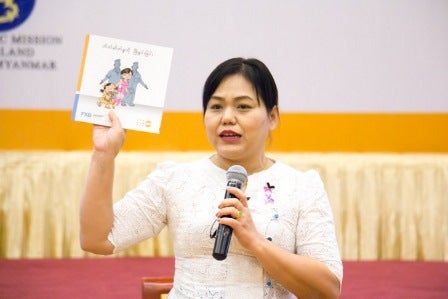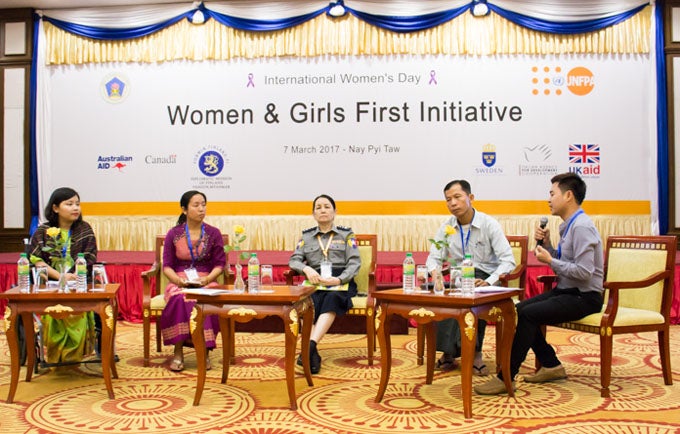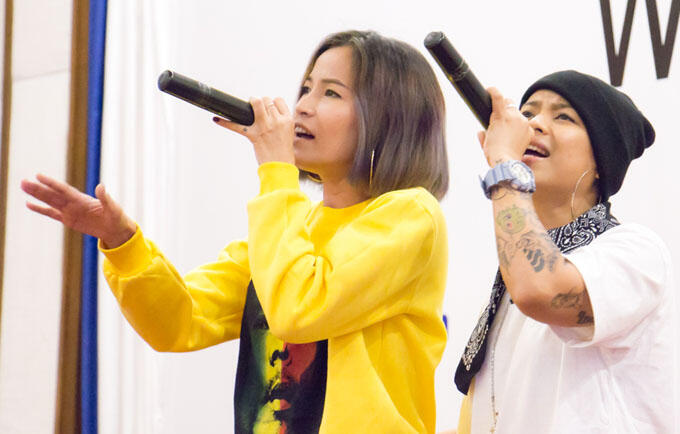On the advent of International Women’s Day, UNFPA celebrated the first year of the Women and Girls First initiative together with a host of local and international partners. At an event in Nay Pyi Taw on 7 March, UNFPA brought together government agencies, implementing partners, donors, beneficiaries, NGOs, civil society organizations and other Women and Girls First stakeholders.
The three-year US$14.5 million joint initiative is funded by UNFPA and the governments of Australia, Canada, Finland, Italy, Sweden and the United Kingdom. Women and Girls First protects the rights of the most vulnerable women and girls in Myanmar. The initiative covers remote and conflict-affected areas in Kachin, Kayin, Mon, Rakhine and Northern Shan.

At the event, Union Minister of Social Welfare, Win Myat Aye, spoke about the importance of having laws in place that protect women. Swedish Ambassador Staffan Herrström described how gender-based violence is a major evil, and called for: “No excuses. No impunity. Never.” Australian Ambassador Karen MacArthur stressed the value of partnerships, saying: “Working together, we can achieve more.”
The multimedia and music part of the agenda showcased stories of both hope and adversity. It featured a photo story about an elderly nun and a child nun: their lives and reasons for becoming nuns. It showed the Myanmar-produced and internationally awarded animated film, “My life I don’t want” about the struggle of one girl, illustrating the discrimination faced by millions of girls in Myanmar today. Rap duo Y.A.K. urged both women and men to stay true to themselves, and to use their inner strength to achieve their goals, and voices from women in Rakhine, who could not travel to the event, were projected onto the screen.
The inclusive panel discussions put donors and beneficiaries around the same table, discussing women’s rights, gender-based violence, and gender equality. One panel member, Khin Yu Zin, fled her home when the armed conflict in Kachin reached her village. She explained how her life changed thanks to the Women and Girls Centre close to her camp. For the first time in her life, she became fully aware of gender discrimination. She told the audience how this awareness healed her and empowered her to become an agent for gender equality in her camp. She said: “We cannot always follow. Sometimes we need to take charge.”
On the same panel was Aung Htwe who also lives in a camp in Kachin after being displaced by armed conflict. Now working as a volunteer for male engagement against gender-based violence in the camps, he told the audience how both women and men hold the key to gender equality. He said: “Traditional roles and customs often hold us back. We must change ourselves first. Only then are we on firm enough ground to change others.”
UNFPA country representative for Myanmar, Janet Jackson, called the Women and Girls First initiative, “a show of solidarity and the coming together of minds and effort to address the complexities related to gender-based violence, sexual and reproductive health, and gender equality in Myanmar.”
During its first year, the Women and Girls First Initiative provided reproductive health care for nearly 48,000 women and girls, and boys and men in Kachin and Rakhine through mobile clinics. Services to prevent and respond to gender-based violence were delivered through women and girls centres, mobile clinics and volunteers in camps for internally displaced people. These services reached 56,000 people in Kachin, Rakhine and Northern Shan.



